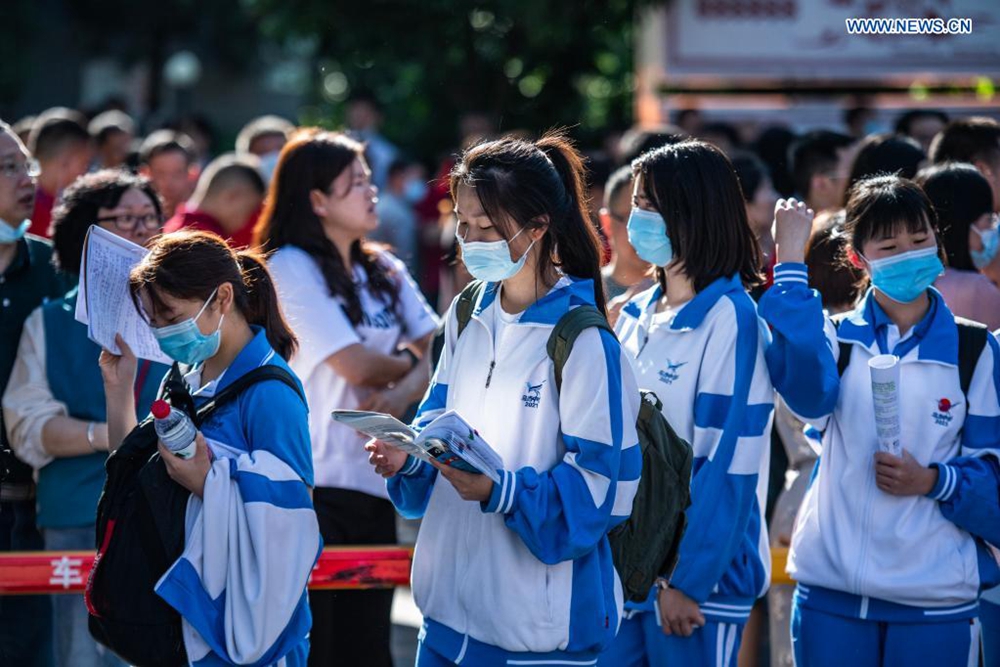Chinese cities upgrade security checks for gaokao examinees in effort to tackle cheating

Examinees wait outside an exam site at a high school in Guiyang City, southwest China's Guizhou Province, June 7, 2021. China's annual college entrance exam, better known as the Gaokao, kicked off Monday morning with a record 10.78 million candidates signing up for perhaps the world's most grueling test. (Xinhua/Tao Liang)
Many places in China have upgraded security checks for this week's college entrance examinations, or gaokao, including installing intelligent security systems with facial recognition for the first time, and asking examinees not to wear ornaments made of metal into exam sites, to prevent cheating and guarantee the fairness of the exam.
In order to eliminate possible misconduct during the exam, the Ministry of Public Security launched a campaign in recent days bringing to light cases involving organized cheating and sales of exam recordings and secret photo-grabbing equipment designed to cheat during the exam.
The campaign was launched days before this year's gaokao, which is scheduled to begin on June 7.
Some provinces, including South China's Guangdong and Southwest China's Yunnan, have upgraded their security checks, including installing intelligent security checks for the first time this year, to detect any electronic equipment such as cell phones, earpieces and electronic watches, or other aids that may assist in cheating. The city of Bijie in Southwest China's Guizhou Province even asked participants to submit to three security checks before entering exam sites.
A teacher surnamed Chen from Southwest China's Chongqing Municipality told the Global Times that this year also marks the first year for the city to install an intelligent security check system. Apart from being able to detect cheating equipment, the system also incorporates facial recognition technology to avoid surrogate test-takers, said Chen, noting that telecom operators will reduce signal transmission power near the exam site.
"The security check for the gaokao this year is the strictest… it is crucial to guarantee fairness of the exam, which is probably the most important one for most Chinese students," said Chen.
Guangzhou of the Guangdong Province warned examinees not to wear clothes with metal elements or metal ornaments, which would trigger a false alarm during the security checks and possibly lead to longer screening times.
China's Ministry of Education (MOE) issued a warning on Sunday for participants in this year's college entrance exam to act with integrity, avoid cheating and be aware of being taken advantage of during the examination.
One participant was sentenced to three years in prison with five years' probation and fined 6,000 yuan ($845) in 2020 for colluding with a paid test taker. The participant, surnamed Zhu, sent pictures of the test to the test taker during the exam, before being fed back the answers. Both Zhu and the test taker were arrested afterwards.
In another case, two organized surrogate test takers for a graduate exam were uncovered in 2020. As a result, the two individuals were sentenced to three years in prison, with the surrogate exam-taker receiving a five-month sentence, with one year of probation.
Criminal elements also took the opportunity to make money. According to the MOE, a number of underground organizations released faked exam questions to participants and their families in return for payment.
A record of 12.91 million people have applied for this year's gaokao, marking an increase of 980,000 from 2022, according to figures released by the MOE last week.
This year also marks the first exam since China downgraded management of COVID-19.
Several cities dropped mask mandates and temperature check for examinees, but still reminded those sitting the exams to monitor their health. Places such as Southwest China's Sichuan and Central China's Hunan issued guidelines saying that examinees will be directed to take tests at back-up sites if they test positive for COVID-19 on the exam dates.